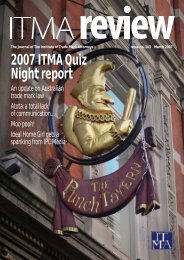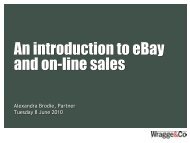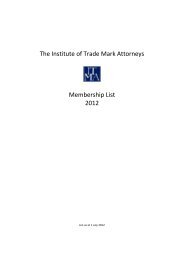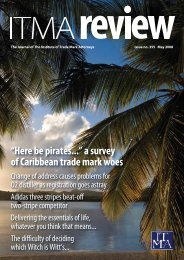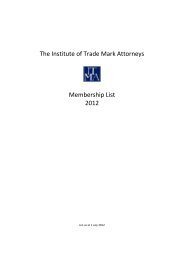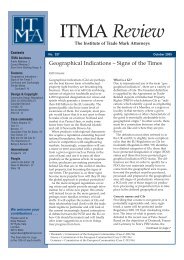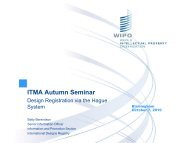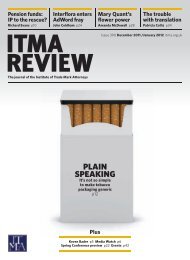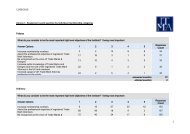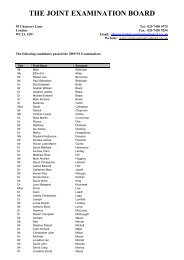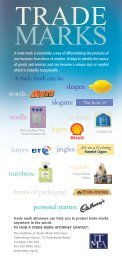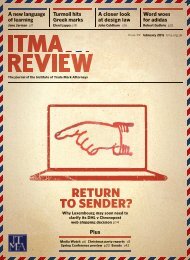ITMA 322 APRIL 2005
ITMA 322 APRIL 2005
ITMA 322 APRIL 2005
You also want an ePaper? Increase the reach of your titles
YUMPU automatically turns print PDFs into web optimized ePapers that Google loves.
Stone Island<br />
CASE COMMENTS<br />
Sportswear Company Spa and Four Marketing Ltd v Sarbeet Ghattaura and Stonestyle Ltd (27 & 28 June <strong>2005</strong>)<br />
before the Honourable Justice Warren<br />
The court had to determine whether the requirement<br />
of having garment codes in the clothing supplied by<br />
the claimant Sportswear Company to its distributors<br />
would constitute a breach of Article 81 of the EU<br />
Treaty, and whether this would disentitle the<br />
claimants from initiating a trade mark infringement<br />
proceedings against the defendants. Article 81 prohibits<br />
an agreement or concerted practice which may<br />
affect trade between member states and whose object<br />
or effect is to prevent unfair competition. It requires<br />
that the effect on trade be appreciable, which is determined<br />
by an economic analysis of the relevant market<br />
and the trader’s place in, and share of it. This has<br />
been explained by the ECJ in Volk v Vervaecke [1969]<br />
EC 295 and Miller v EC Commission [1978] 2 CMLR<br />
334.<br />
The claimants, Sportswear Company, alleged<br />
infringement of their trade mark STONE ISLAND<br />
and wanted to prevent the sale of their clothing under<br />
the brand name by the defendants, Sarbeet Ghattaura<br />
and Stonestyle Ltd, because they have been selling<br />
Stone Island clothing with labels defaced and/or<br />
swing tags cut out and defaced. The labels had garment<br />
codes which help the claimants to find out to<br />
which of its distributors/customers their clothing was<br />
originally sold. The defendants alleged that the intention<br />
of the claimants is mainly to locate the person to<br />
whom the clothing was originally supplied through<br />
the garment codes, so that they can cut off supplies<br />
and ruin the defendants’ business.<br />
Beside this, the defendants also rely on the agreements<br />
made by the claimants, which the defendants<br />
believe to be anti-competitive and in breach of Article<br />
81 of the EU Treaty. This refers to Section 12(2)1 of the<br />
Trade Marks Act, 1994, which states that Section 12(1),<br />
which refer to exhaustion of proprietors’ rights, does<br />
not apply where there exists legitimate reasons for the<br />
proprietor to oppose further dealings in the goods (in<br />
particular, where the condition of the goods has been<br />
changed or impaired after they have been put on the<br />
market).<br />
The defences did not clearly state two issues, ie<br />
how the agreements affect trade between member<br />
states in the context of “appreciable effect of trade”,<br />
because the claimants had stated that they are a small<br />
undertaking and therefore their activities would not<br />
have an appreciable effect on trade, and even if there<br />
be a breach of Article 81, how it would be a defence to<br />
a trade mark infringement.<br />
The defendants accepted that they were wrong with<br />
respect to the above point and were given an opportunity<br />
to amend the pleadings. The claimants stated<br />
that there is no nexus between the relief sought and<br />
the breach of Article 81. Actually, the defendants<br />
claim the right to do what they would otherwise be<br />
prohibited because of some contractual relationship<br />
between the claimants and third parties. In this<br />
regard, the judgment of Sir Robert Megarry VC in<br />
Imperial Chemical Industries v Berk Pharmaceuticals,<br />
[1981] FSR 1, 2 CMLR 91 was relied by the judge in<br />
arriving at a decision regarding the defence. In that,<br />
the judge struck out a paragraph in the defence which<br />
pleaded that by reason of breaches of Article 86 [now<br />
Article 82] the plaintiffs were debarred from relief<br />
against passing off on the ground of the lack of nexus<br />
between the abuse pleaded and right claimed by the<br />
defendants. It was decided that there is no nexus<br />
between the alleged anti-competitive agreement made<br />
by the claimants and the current trade mark infringement<br />
proceedings. The judge also relied upon Sandvik<br />
v Pffifner [2000] FSR 17 at p 62, in that Neuberger J<br />
made the point that there needs to be a nexus<br />
between the alleged anti-competitive agreement and<br />
the proceedings in the context of a patent infringement<br />
action where defenses based on breach of<br />
Community law were raised.<br />
The defendants and the claimants referred to the<br />
decision of Laddie J in Philips Electronics NV v Ingman<br />
Ltd [1999] FSR 112. The defendants further relied on<br />
the decision of Court of Appeal in Intel Corporation v<br />
Via Technologies Inc [2002] EWCA Civ 1905 to show<br />
that a breach of Article 81 can give rise to a defence to<br />
patent infringement proceedings and the same<br />
applies to trade mark infringement proceedings.<br />
However in the Philips case, the complainant had<br />
forced the defendant to enter into a licence agreement,<br />
which violated Article 81. Therefore, it was<br />
decided that both the cases were not appropriate to<br />
the current issue.<br />
The defendants submitted arguments to show that<br />
there is a nexus between EU competition law and the<br />
Trade Marks Act 1994. They relied on what was said<br />
in the ECJ case, Frits Loendersloot t/a Loendersloot<br />
Internationale Expeditie v George Ballantine & Sons Ltd.<br />
This case involves removal of identification numbers<br />
from whisky bottles. Paragraph 43 states:<br />
“Where it is established that the identification numbers<br />
have been applied for purposes which are legitimate<br />
from the point of view of Community law, but<br />
are also used by the trade mark owner to enable him<br />
Continued on page 20<br />
1 12 (1) A registered trade mark is not infringed by the use of the trade mark in relation to goods which<br />
have been put on the market in the European Economic Area under that trade mark by the proprietor or<br />
with this consent.<br />
(2) Subsection (1) does not apply where there exist legitimate reasons for the proprietor to oppose further<br />
dealings in the goods (in particular, where the condition of the goods has been changed or impaired after<br />
they have been put on the market).<br />
December <strong>2005</strong> <strong>ITMA</strong> Review 19



